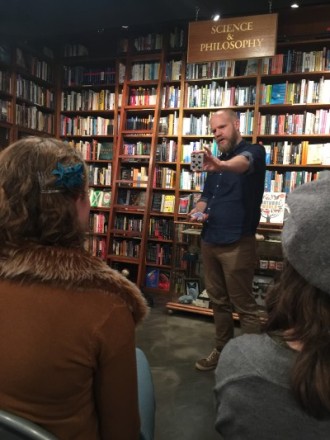Now in its third year, we again had a number of high calibre applications submitted into our Grants Program. We only wish we could award everyone who applied and of course thank all those members who took the time to apply for the grants and internship on offer.
After a peer-review process, we are pleased to announce that the recipients of the following ASC Professional Development Grants for 2016 are:
The ASC Professional Development Grant worth $600 was awarded to Lydia Hales. Lydia will be using the grant to attend the 2017 Iceland Writers Retreat. The Writers Retreat includes five workshops, a welcome dinner, receptions, and writing tours. The workshops are capped at a maximum of 15 people, with an emphasis on interaction between the featured authors and the attendees. Read about Lydia’s adventures in Iceland here.
The Peter Pockley Grant for Professional Development in Investigative Journalism worth $600 was awarded to Kylie Sturgess. Kylie will be using the grant to attend the CAL writing creative radio workshop in Katoomba during December. Kylie is keen to extend her audio skills in long form format and the science documentary field, and we felt that she was a worthy recipient of the prestigious Peter Pockley grant. Hopefully we’ll be able to reap the rewards of Kylie’s PD come the new year.
The MD Writing and Editing Coaching Program was awarded to student member Sarah Bradley. Sarah wants to undertake a PhD in the future and hopes that through this experience she can write more clearly and in a form that is easy to understand. We are sure she’ll benefit from Dr Malini Devadas tuition, and again thank Malini for offering this experience to our members.
The Cosmos Media Internship was awarded to Andrew Stapleton. Andrew plans on starting his internship in mid-late January, 2017, where he will gain invaluable experience from other writers and editors and learn the ins and outs of one of Australia’s most respected science magazines.
“While it was a difficult choice, Andrew’s passion for science magazine journalism and engaging new audiences, along with his science background and keen interest in developing his skills, led us to conclude that he’d be the best fit for this internship.”
— April Reese, Managing Editor, COSMOS Magazine
Please join me in congratulating our members on their awards and we look forward to hearing about their PD in coming weeks and months through the Scope e-newsletter.
Once again a big thank you to our 2016 sponsors and we look forward to working with you in the future to provide further opportunities for our members.
Thanks,
Drs Ian McDonald and Miriam Sullivan
ASC Grants Program Co-Managers

